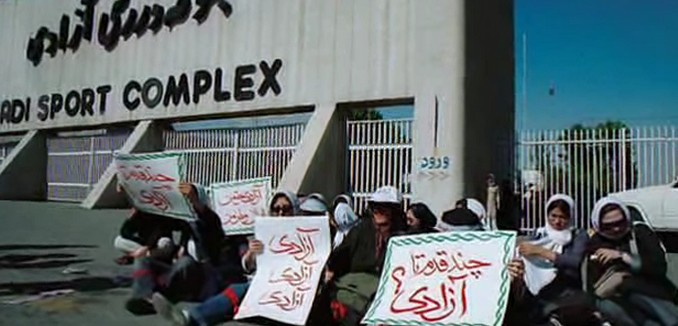Iranian women are hoping to attend the June 19 volleyball match between Iran and the United States at Azadi Stadium in Tehran, but official and unofficial forces are arrayed against them, according to a report published Wednesday in The Daily Beast.
Although Iran’s vice-president for women’s affairs has said that 500 women will be allowed to watch the match, other relevant government agencies have not confirmed that this is the government’s policy. Some activists fighting against the women, including clergyman Hamed Vasfi, who was interviewed by The Daily Beast, claim that allowing women to watch sporting events in stadiums would promote “prostitution.”
This year, hardliners have been quick to remind authorities and the public that June 19 falls on the second day of the holy month of Ramadan, a month of fasting, prayers, and mourning for martyred saints. Lifting the ban on women watching sports in stadiums would be altogether anti-Islamic, hardliners claim, particularly during such a holy time.
Iravani Religious Seminary, headed by the prostitution-fearing Vasfi, is among the groups that support the ban, and has appealed to the “faithful” to gather outside Azadi Stadium to prevent women from entering on June 19. The seminary regularly speaks out against what it sees as “moral corruption” in society, targeting women in particular. It and Ansar-e-Hezbollah, which is essentially a group of hardline vigilantes, were behind a 2014 rally against “bad hejab.” Organizers encouraged the public to take part in the protest, despite its failure to obtain Interior Ministry authorization. …
Some of the leaflets being distributed warned of a “bloody uprising,” but Vasfi backed away from those, suggesting they came from Ansar-e-Hezbollah. Although both groups are working against women being allowed in stadiums, they had separate campaigns, and separate messages to deliver, said Vasfi, so the seminary had nothing to do with the “bloody uprising” message. He insisted that even though the name of the seminary was printed alongside Ansar-e-Hezbollah on the leaflets, his institution wasn’t involved. Vasfi said that Iravani Seminary had only sent text messages to its supporters, promoting the protest outside the stadium on June 19.
Vasfi said he would support the ban on women attending sporting events even if it hurt Iran’s image, adding that “[o]ur team might have to play against Israel, in which case we would have to forfeit the championship. Our values are more important for our country than international competitions are.”
Ghoncheh Ghavami, a female British-Iranian citizen, was jailed last year for attempting to attend a volleyball match. Following her arrest, The New York Times reported that activists were concerned that the “limits of personal expression and rights” had not been removed since Hassan Rouhani became Iran’s president nearly two years ago.
There were a number of acid attacks last year against Iranian women who were insufficiently veiled.
Earlier this year, Iran proposed a number of laws that would further marginalize women in society, but a month later Iran was elected to head United Nations Women, an organization dedicated to ensure global women’s equality.
[Photo: OpenStadiums 4 Iranian women / YouTube ]




